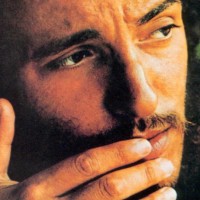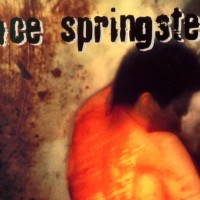I can’t honestly remember if I had expectations about Bruce Springsteen’s reactions to the events of September 11, 2001. While many Americans’ views had hardened into position by the time The Rising arrived on July 30, 2002, mine had yet to take shape. It turned out Springsteen had a hopeful outlook, though he did look at the issues from more than one side. Here’s a look at five key tracks from the album – some well-known, some less so, some weirdly controversial …
“Lonesome Day” brings up a lot of the issues that had me wondering what to think of the whole situation. Early on in the post-9/11 world, there was a high level of camaraderie and spirit. People were amazingly respectful of those wearing the uniform, police and fire in particular. I had never experienced such a thing.
Like a lot of my neighbors, I’d begun to display an American flag on my house. I wanted to show solidarity with those who had lost loved ones. Sadly, those good and cohesive feelings began to vaporize. Pickup trucks began to drive the streets, the Stars & Stripes mounted in the truck bed augmented with signs indicating that it was time to teach “The Towel-heads” a lesson.
I took the flag off the side of my house.
House is on fire, Viper’s in the grass
A little revenge and this too shall pass
At the shows I’ve been to since then, the raised hands during the “It’s alright …” parts of this song felt particularly good, as if the healing had begun. So many years later, I’m not sure that that’s the case. We still haven’t healed. Maybe we never will. But the question remains: Who is the enemy now?
Oh yeah, the song that the “fans” love to hate. If you ask the typical fan on a Bruce Springsteen message forum, “Waitin’ on a Sunny Day” will come out on top as the “bathroom break” song. It is, apparently, a throwaway track, too lightweight to be taken seriously. Its odious and happy violin riff (my Gawd, will Bruce just get rid of Soozie already?!) is enough to make a fan stick a pencil in his ear. The song is so terrible that it has ruined many E-Street shows.
Right.
Springsteen plays it regularly, deeming it one of the “new classics” for his younger generation of fans. The complainers would have you believe that a vast majority of fans hate the song. But hey, look around the arena during the song: If the vast majority of fans hate it, they have a funny way of showing it. All I see is a ton of people having a load of fun. It’s not exactly my favorite Bruce song either, but I can’t deny the fun in it. Heck, even the little kid singalong can be funny. Relax, will ya?!
Don’t believe me? Check out this Bruce Springsteen performance at Hyde Park, where that sea of fans clearly hated the song from start to finish.
When The Rising first came out, the meaning of the songs of pure loss – “Empty Sky” and “You’re Missing” in particular – could only come out of the context of the events of 9/11. Though you might be able to take the story of “You’re Missing” and apply it to say, a broken marriage or any sudden death, I’d never thought of it that way.
But one of the great things about songwriting is that the listener can bring in their own experiences, taking meaning as they see fit.
Though my dad passed away for years, I’d never gotten around to unpacking his last suitcase – the one he’d taken into the nursing home. It had been sitting in a closet all of this time. I just couldn’t do it. Then, we were getting our house ready to rent out. It was time to deal with this thing.
Coffee cups on the counter, jackets on the chair
Papers on the doorstep, you’re not there
Dad read the newspaper every morning. So did I. Every night during those last six months, I came home from work and then drove to the home for a visit, bringing him that morning’s Boston Globe.
Pictures on the nightstand, TV’s on in the den
Your house is waiting, your house is waiting
The most interesting items in that little suitcase were the photos. Just two: one of my grandmother and one of me and my dog (truthfully, his dog too). No pictures of mom, who had passed on just three months before dad took ill. I don’t remember dad refusing photos of mom, though maybe he didn’t need the reminder. Two of the toughest moments for me in this time period: when he started referring to our house as your house — he knew he wasn’t coming back; and when he took off his wedding ring and handed it to me. I asked him if he was sure. “Yes.”
So, what I take from “You’re Missing” has necessarily changed over time. Not Springsteen’s original intent, but I don’t thing he’d mind.
There are points during nearly all concerts where the emotions and internal language of the music can take over to express something that’s out of the grasp of mere words. For me, this phenomenon isn’t particular to Bruce Springsteen shows, as I’d count singer/songwriters Greg Brown and Dar Williams, and guitarist Pat Metheny as capable of creating that sort of transformative experience.
With “The Rising,” a song not just of 9/11 but more broadly a song of the struggles of life, that moment comes with the simplest lyric: “Li,li, li,li,li,li, li,li,li.”
The song builds slowly and powerfully throughout, with each gospel-infused chorus acting as a slingshot into the next verse. The tension rises as Bruce drops back for the “Sky of/Dream of Life” sequence, exploding into that last chorus, which is in turn amplified again by the simple “Li, li…”
If you’ve ever seen Bruce Springsteen talk about this on VH1 Storytellers, you’ll know that he said those words stand in for: “Sing with me. Stand alongside me.” And that’s exactly what it feels like.
Written about the decay and subsequent revival of Asbury Park, “My City of Ruins” has taken on many other roles since its release. For my money, the most moving and powerful context that Bruce Springsteen placed it in began with the gospel and horn-drenched unveiling at that legendary Apollo Theater show.
Bruce took the opportunity to transform a band roll call into a statement of solidarity with E Street Nation. Those who’d been lost (Danny Federici and Clarence Clemons) were brought up with a simple question: “Are we missing anybody?” The reassurance – that they are not just “ghosts,” but indeed a part of us – came with this response:
The only thing I can guarantee tonight … if you’re here and we’re here, they’re here. If you’re here and we’re here .. they’re here.
I had a strange thing happen with that moment of the Apollo show. The day after, me and TheWife™ had gone on a visit to the campus of my alma mater. She was there on business, while I wandered around trying not to be overwhelmed by memories. I was not particularly successful.
After remembering just how proud my parents were to see me off to college, I had the urge to tell them just how nice it felt to be there again, but they’re no longer here. A few minutes later, I sat in my car and heard via email about the previous night’s Apollo show and Bruce’s statement. It was a weird and wonderful bit of synchronicity.
Some folks think that there’s no spiritual side to Bruce Springsteen’s music, that we as fans can take nothing away for ourselves – that the shared experience has no value. They need to think a little harder about what “we” really means.
- Why the Rolling Stones’ Harrowing ‘Gimme Shelter’ is Still Revealing New Depths - November 18, 2024
- How Talking Heads’ ‘Fear of Music’ Opened Up a World of Art and Sound - August 5, 2024
- How Deep Cuts Propelled Bruce Springsteen’s ‘Born in the U.S.A.’ - June 4, 2024




Lovely. Thank you. A wonderful record that I’ll cherish for the rest of my days. And to those who say there’s no spiritual side to Springsteen? Ha! Incorrect…